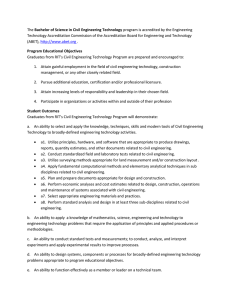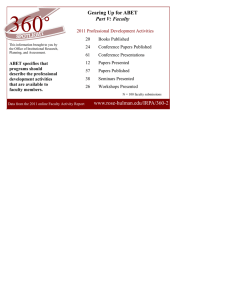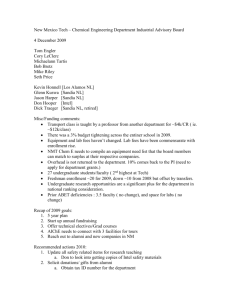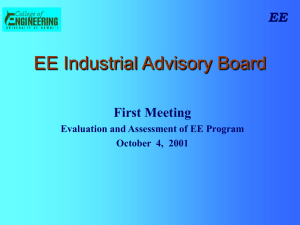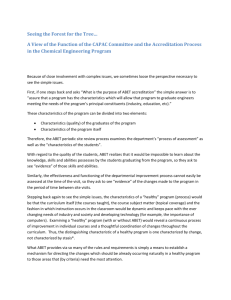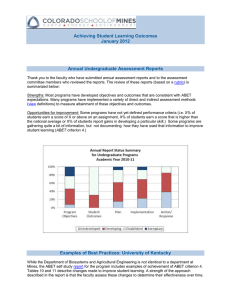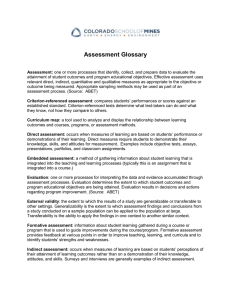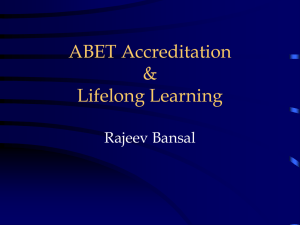Process for Review of Program Educational Objectives and Student Outcomes
advertisement
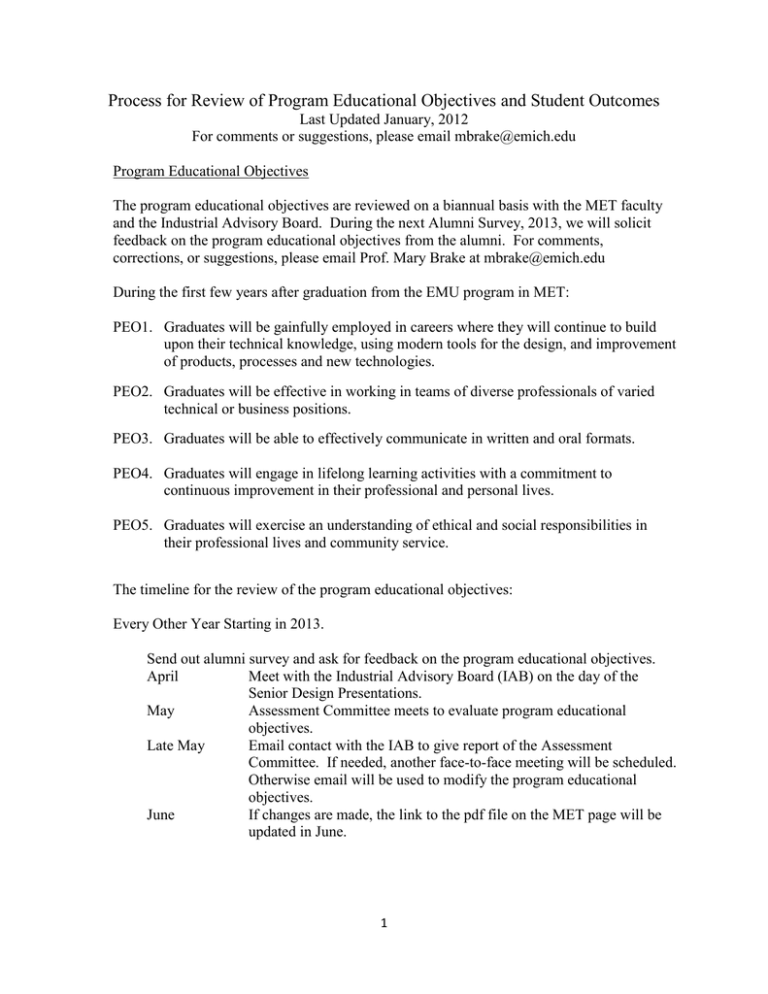
Process for Review of Program Educational Objectives and Student Outcomes Last Updated January, 2012 For comments or suggestions, please email mbrake@emich.edu Program Educational Objectives The program educational objectives are reviewed on a biannual basis with the MET faculty and the Industrial Advisory Board. During the next Alumni Survey, 2013, we will solicit feedback on the program educational objectives from the alumni. For comments, corrections, or suggestions, please email Prof. Mary Brake at mbrake@emich.edu During the first few years after graduation from the EMU program in MET: PEO1. Graduates will be gainfully employed in careers where they will continue to build upon their technical knowledge, using modern tools for the design, and improvement of products, processes and new technologies. PEO2. Graduates will be effective in working in teams of diverse professionals of varied technical or business positions. PEO3. Graduates will be able to effectively communicate in written and oral formats. PEO4. Graduates will engage in lifelong learning activities with a commitment to continuous improvement in their professional and personal lives. PEO5. Graduates will exercise an understanding of ethical and social responsibilities in their professional lives and community service. The timeline for the review of the program educational objectives: Every Other Year Starting in 2013. Send out alumni survey and ask for feedback on the program educational objectives. April Meet with the Industrial Advisory Board (IAB) on the day of the Senior Design Presentations. May Assessment Committee meets to evaluate program educational objectives. Late May Email contact with the IAB to give report of the Assessment Committee. If needed, another face-to-face meeting will be scheduled. Otherwise email will be used to modify the program educational objectives. June If changes are made, the link to the pdf file on the MET page will be updated in June. 1 Student Outcomes The a – k student outcomes using the 2011 – 2012 ABET definitions are: a. an ability to select and apply the knowledge, techniques, skills, and modern tools of the discipline to broadly-defined engineering technology activities; b. an ability to select and apply a knowledge of mathematics, science, engineering, and technology to engineering technology problems that require the application of principles and applied procedures or methodologies; c. an ability to conduct standard tests and measurements; to conduct, analyze, and interpret experiments; and to apply experimental results to improve processes; d. an ability to design systems, components, or processes for broadly-defined engineering technology problems appropriate to program educational objectives; e. an ability to function effectively as a member or leader on a technical team; f. an ability to identify, analyze, and solve broadly-defined engineering technology problems; g. an ability to apply written, oral, and graphical communication in both technical and nontechnical environments; and an ability to identify and use appropriate technical literature; h. an understanding of the need for, and an ability to, engage in self-directed continuing professional development; i. an understanding of, and a commitment to, address professional and ethical responsibilities including a respect for diversity; j. a knowledge of the impact of engineering technology solutions in a societal and global context; and k. a commitment to quality, timeliness, and continuous improvement. We have also defined three more student outcomes which we label ‘l – m’ based upon the criteria taken from the MET program criteria described by ABET in the 2011 – 2012 guidelines found at the ABET website http://abet.org/Linked%20DocumentsUPDATE/Program%20Docs/abet-tac-criteria-2011-2012.pdf. (This link is no longer available but these definitions were used for 2011.) The ‘l – m’ outcomes will be reviewed and updated at the assessment meeting in May. The ‘l – m’ outcomes based upon the description of MET programs in the 2011 – 2012 guidelines are: l. Technical expertise encompassing the areas of materials (including strength of materials), statics and dynamics, fluid mechanics, thermodynamics and electronics. m. Technical expertise in computer-aided drafting/design, manufacturing, experimental techniques/procedure, analysis of engineering data, and machine/mechanical design. 2 n. Expertise in the analysis, design, development, implementation, or oversight of more advanced mechanical systems. The schedule for review of the student outcomes is as follows: January Program Coordinator will go to the ABET website to find the most recent student outcomes as defined by ABET. The link for 2012 – 2013 is: http://abet.org/criteria-engineering-technology-2012-2013/ February Inform faculty of any changes to the student outcomes. Make suggestions to modify the MET specific student outcomes. April Meet with the Industrial Advisory Board (IAB) on the day of the Senior Design Presentations. Updates in the student outcomes will be presented along with discussion of repercussions for the MET program. Modifications to the student outcomes will be presented and discussed. May Assessment Committee meets to evaluate assessment of student outcomes and design an action plan to remedy any deficiencies. Also, the Assessment Committee will review the student outcomes and discuss how to implement any changes suggested by the IAB. Committee will come up with additional plans for the assessment to stay current with the relevant student outcomes. Late May Email contact with the IAB to give report of the Assessment Committee. If needed, another face-to-face meeting will be scheduled. Otherwise email will be used to decide on action plans. Academic Year Assessment is collected Academic Year Small action plans will be emailed to the IAB for input Academic Year The School of Engineering Technology meets once per month. Curriculum issues will be presented to the Instructional Committee and then sent to the SET faculty for review. Academic Year Changes to program or courses will be submitted to the School of Engineering Technology (SET) for approval. Academic Year If changes are approved, they will be sent to the University Input System for approval, which meets during the academic year. Following A.Y. Changes will be implemented at the University level. 3
